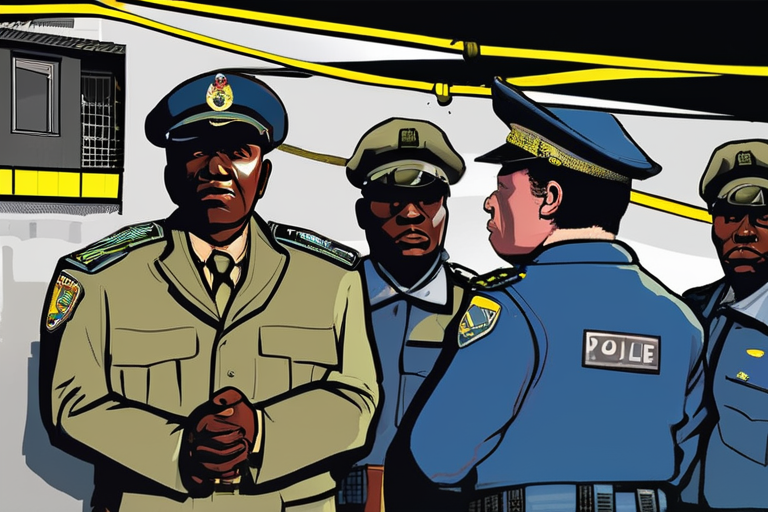The Dark Allure of War: How Kenyan Police Broke Up a Human Trafficking Ring Luring Citizens to Fight in Ukraine
In the heart of Nairobi's Athi River area, a group of 22 unsuspecting Kenyans were waiting with bated breath for their "processing" to Russia. Unbeknownst to them, they had been lured by a sophisticated human trafficking ring that promised lucrative jobs but had other plans – to send them to fight in Ukraine on behalf of the Russian army. It was a scheme so brazen, it caught the attention of Kenyan police, who launched an intelligence-led raid on the apartment, bringing an end to the nefarious operations.
The rescue operation, which took place on Wednesday, marked a significant victory for law enforcement agencies in Kenya, but it also highlighted the alarming trend of human trafficking that has been sweeping across the country. According to authorities, the suspected traffickers had been extorting huge sums from desperate Kenyan job seekers, who were promised well-paying jobs in Russia.
The operation was the culmination of months of investigation and coordination between multiple agencies, including the Directorate of Criminal Investigations (DCI) and other security organs. The police say they have arrested one suspect, accused of coordinating the victims' travel to Russia in September and October. He has been taken to court and detained for 10 days while the police complete their investigations.
The case is a stark reminder of the devastating consequences of human trafficking, which preys on vulnerable individuals who are desperate for employment opportunities. The Kenyan government has long been concerned about the rising number of citizens being trafficked abroad under false job promises. Just last month, a young Kenyan athlete was captured in Ukraine, claiming he had been tricked into joining the Russian army.
"I'm Kenyan, don't shoot," the athlete pleaded, his words echoing the desperation and fear that many victims of human trafficking experience.
The case also raises questions about the role of social media and online platforms in facilitating human trafficking. The police say they found recruitment materials, travel documents, and job offer letters during their raid, which were used to lure unsuspecting Kenyans into the trap.
As the world grapples with the complexities of modern-day slavery, the case highlights the need for increased vigilance and cooperation between governments, law enforcement agencies, and civil society organizations. It also underscores the importance of education and awareness-raising efforts to prevent human trafficking and protect vulnerable individuals.
The rescue operation is a testament to the bravery and dedication of Kenyan police officers who risk their lives every day to keep citizens safe. As one officer noted, "We will not tolerate any form of exploitation or abuse of our citizens. We will continue to work tirelessly to bring perpetrators to justice."
For the 22 rescued Kenyans, the operation marks a new beginning – an opportunity to rebuild their lives and seek justice for the trauma they have endured. Their story serves as a poignant reminder of the human cost of human trafficking and the need for collective action to prevent this heinous crime.
As we reflect on this case, let us remember that human trafficking is not just a crime against individuals; it is a threat to our shared humanity. It is a stark reminder of the importance of empathy, compassion, and solidarity in the face of adversity.
Context and Background
Human trafficking has been a persistent challenge for Kenya, with many citizens falling prey to false job promises and being exploited abroad. The country's strategic location and economic challenges have made it an attractive target for traffickers, who often use social media and online platforms to lure victims.
The case highlights the need for increased cooperation between governments, law enforcement agencies, and civil society organizations to prevent human trafficking and protect vulnerable individuals. It also underscores the importance of education and awareness-raising efforts to prevent human trafficking and promote safe migration practices.
Multiple Perspectives
While the police operation has been hailed as a success, some critics have raised concerns about the need for more robust measures to prevent human trafficking. "This is just one case among many," said a human rights activist. "We need to do more to address the root causes of human trafficking and provide support to victims."
Others have called for greater accountability from governments and international organizations to prevent human trafficking. "We cannot rely on law enforcement agencies alone to solve this problem," said a government official. "We need to work together to create an environment that is hostile to human trafficking and promotes safe migration practices."
Conclusion
The rescue operation in Nairobi serves as a powerful reminder of the devastating consequences of human trafficking. It highlights the need for increased vigilance, cooperation, and education to prevent this heinous crime and protect vulnerable individuals.
As we move forward, let us remember that human trafficking is not just a crime against individuals; it is a threat to our shared humanity. Let us work together to create a world where no one is exploited or abused – a world where everyone has the opportunity to live with dignity and respect.
*Based on reporting by Bbc.*



 Hoppi
Hoppi

 Hoppi
Hoppi

 Hoppi
Hoppi

 Hoppi
Hoppi

 Hoppi
Hoppi

 Hoppi
Hoppi











